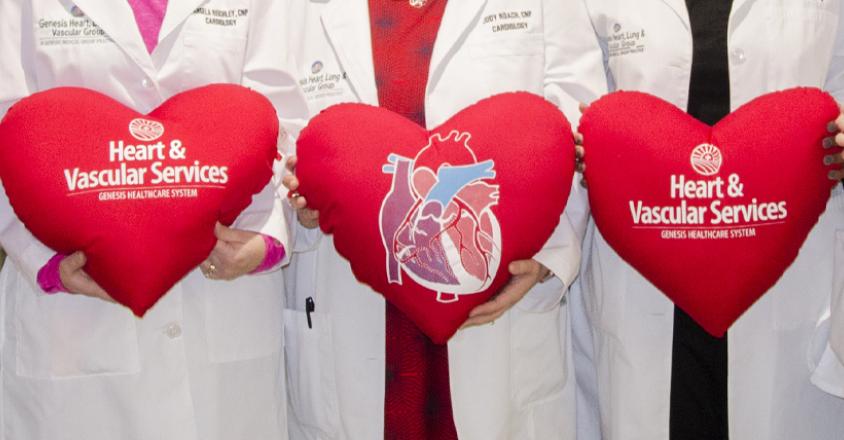

Heart pillows: Pressure can reduce pain for cardiac patients
Friday, July 17, 2020
Sneezing, coughing, movement are more manageable for patients
Open heart surgery—a serious but highly successful operation—can make everyday actions like coughing, deep breathing, sneezing, laughing, getting out of bed and even the hiccups uncomfortable for patients right after surgery. Open heart surgeries require dividing the sternum (chest cavity) to allow access to the heart, so the breastbone and chest area need extra support for up to three months following the procedure.
One of the ways patients have been able to reduce their discomfort after open heart surgery is with the use of a heart-shaped pillow—filled with firm stuffing, that can help provide comfort, reduce pain and protect the surgery’s incision site.
But how can a non-medicated pillow help with pain?
Heart pillows can help reduce pain after surgery
Because of the increased risk of pneumonia and respiratory issues after surgery, patients are asked to cough and breathe deeply frequently so their lung fully expand and to get rid of phlegm. As part of the recovery process, patients also breathe into a device called an incentive spirometer multiple times a day for the first month to keep their lungs healthy after surgery.
Having a heart-to-heart hug with these pillows can lessen pain and makes movement more manageable for patients who’ve recently undergone coronary artery bypass grafting, valve repair or valve replacement. Clasping the heart pillow offsets the pain and safeguards the incision site.
“Patients embrace the heart pillow whenever they need to brace themselves for movement that might cause pain or injury to the incision site. If your pain is well managed, the more you will be able complete breathing exercises and walking that are important to your recovery,” says cardiothoracic vascular surgeon Philip Bongiorno, MD.
Pressure helps protects the incision site
After open heart surgery, incision care is extremely important. Patients are instructed to avoid lifting anything that weighs more than 10 pounds, but research has found that a cough pushes about 60 pounds of pressure against the sternum, while a sneeze places 90 pounds of pressure in the same area.
Bursts of pressure that powerful might break internal wires from surgery that hold the breastbone together. If one of these vital wires breaks, the only way to fix it is undergoing another surgery.
When a patient holds the heart pillow tightly against his or her chest, the pillow provides an extra layer of pressure to counteract any jolting from a cough, sneeze or movement. It helps reduce pain because it holds the incision and sensitive skin surrounding the incision firmly in place.
So what’s in a pillow anyway?
Filled with firm stuffing, so a squeeze won’t squish them flat like a child’s stuffed animal, the red heart pillows measure about 18 inches wide and 12 inches tall. Each pillow features a printed diagram of the anatomy of the heart, which comes in handy during conversations when patients explain their procedure to friends and family. Genesis staff members often autograph the pillows and write well wishes to the patient making it a huggable memory book too.
Originally, Genesis handed out large teddy bears for the same purpose. The bear, nicknamed “Sir Coughs-A-Lot,” was replaced by the heart pillow in 2013, because the wide shape of the heart provides better chest coverage. Plus, patients report having an easier time using the heart-shaped pillow effectively.
Patients use tightly folded blankets in the hospital
Upon leaving Genesis Hospital, open-heart surgery patients often clutch heart-shaped pillows to their chest. Genesis nurses present the pillow to the patient when it’s time to leave the hospital and complete recovery at home. Waiting until the time of departure ensures that the pillow remains sanitary for the patient.
While recovering in the hospital, patients use tightly folded blankets to provide similar sternum support, gripping the folded blanket to buffer pressure, pain and pulling, and to protect against repeat surgeries.
The heart pillows have become a prized possession to many Genesis cardiac patients. Patients often regard these pillows as a trophy – they represent surviving a traumatic and life-saving surgery. Most patients express tremendous gratitude for the procedure, and for the pillow too.
Heart pillows for electrophysiology and cardiac cath lab patients
Patients who undergo procedures that open the sternum, like coronary artery bypass grafting, valve repair or valve replacement surgery, receive the larger, firm heart-shaped pillows, but Genesis cardiac patients with different types of procedures receive a different type of heart pillow.
A generous group of Genesis volunteers sews and donates smaller, softer heart-shaped pillows for patients who experience procedures in the Cath Lab or Electrophysiology Lab. These colorful pillows can come in solid colors or wild prints and patterns. The volunteers happily use whatever type of fabric they can find. These heart pillows prop up patients, provide comfort and offer a personal touch.
Each year, an average of 3,500 heart pillows go home with Genesis cardiac patients including the firm postoperative pillows and the soft ones made by volunteers. For cardiac patients, Genesis heart pillows offer a huggable memento that lasts long after scars heal.



